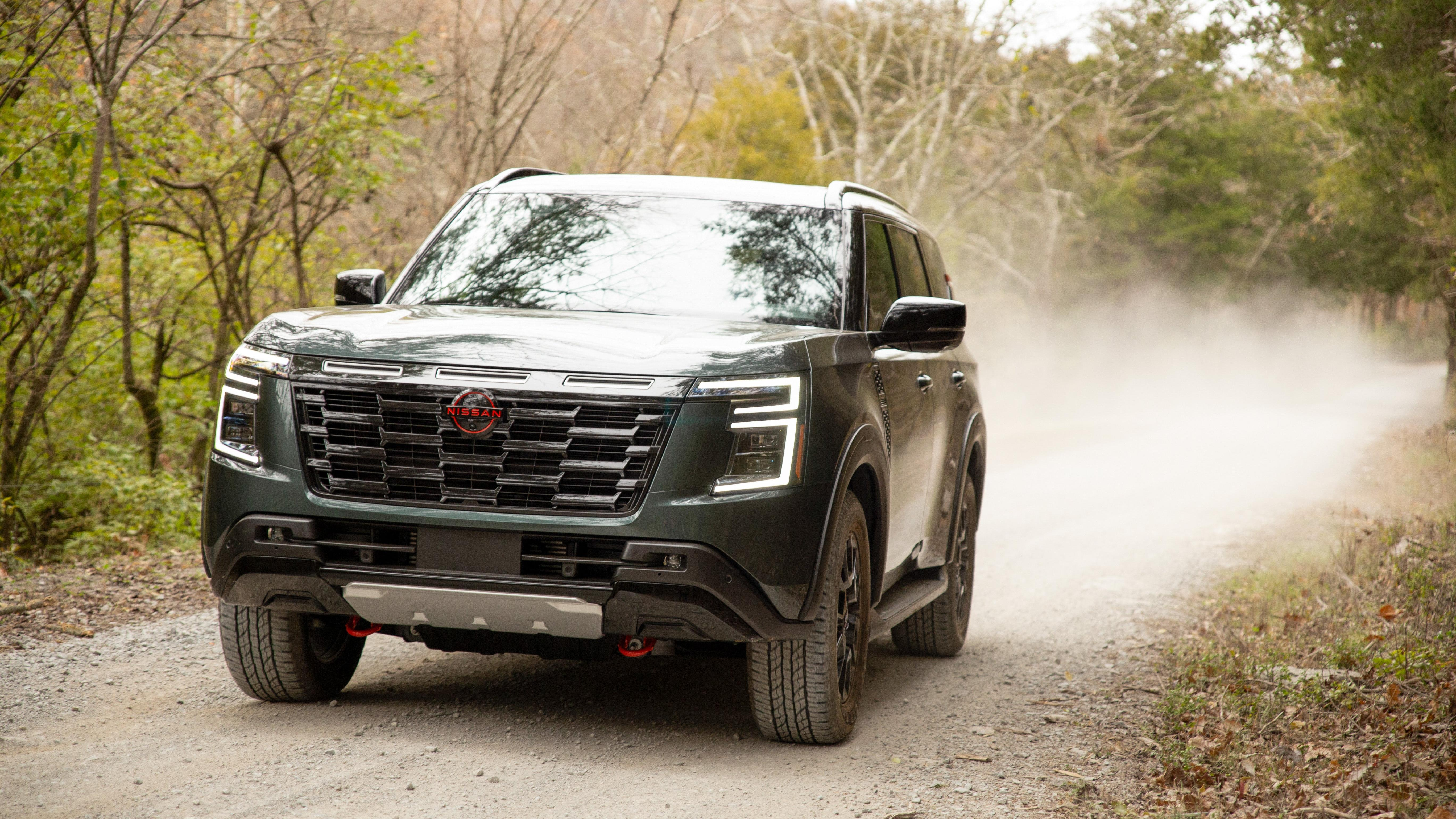2025 Nissan Armada Is Finally The Patrol We've Been Asking For
In Pro-4X trim, this three-row SUV can handle some pretty serious off-roading.
Last time Nissan redesigned the Armada it was a big deal, and not just for the Nissan dealers who desperately needed something that wasn't more than a decade old in the lineup. You see, for the 2017 model year, Nissan brought over the SUV known in international markets as the Patrol and gave it the Armada badge. While the Patrol name might not mean much here, in other markets and among enthusiasts, it's a legendary off-roader that gives the Toyota Land Cruiser a real run for its money.
Except the 2017 Nissan Armada didn't come with most of the off-road goodies that made the Patrol into a Land Cruiser rival. You could always modify it and add those things if you really wanted to, but the Armada was much more focused on getting a pile of kids around town than bashing sand dunes and crawling up rock faces.
For the new third-generation Armada, however, Nissan listened to the complaints, and you can now get an Armada Pro-4X that comes with an air suspension, metal skid plates and a locking rear differential just like the rest of the world gets with the Patrol. Clearly, Nissan isn't messing around here. If you don't plan to go off-roading in Moab anytime soon, though, does the latest redesign offer enough of an incentive for buyers to choose the 2025 Armada over more established competitors such as the Ford Expedition and Chevrolet Tahoe? And just how good is this thing off-road?
Full Disclosure: Nissan wanted me to drive the new Armada so badly, it offered to fly me to Nashville so I could drive it at the launch. I instead elected to drive myself to save time. Sadly, Nissan didn't have a Z in the Atlanta fleet that I could use. Nissan also put me up in a very nice room at a fancy hotel in Franklin that grows its own vegetables, bought my meals and provided plenty of drinks.
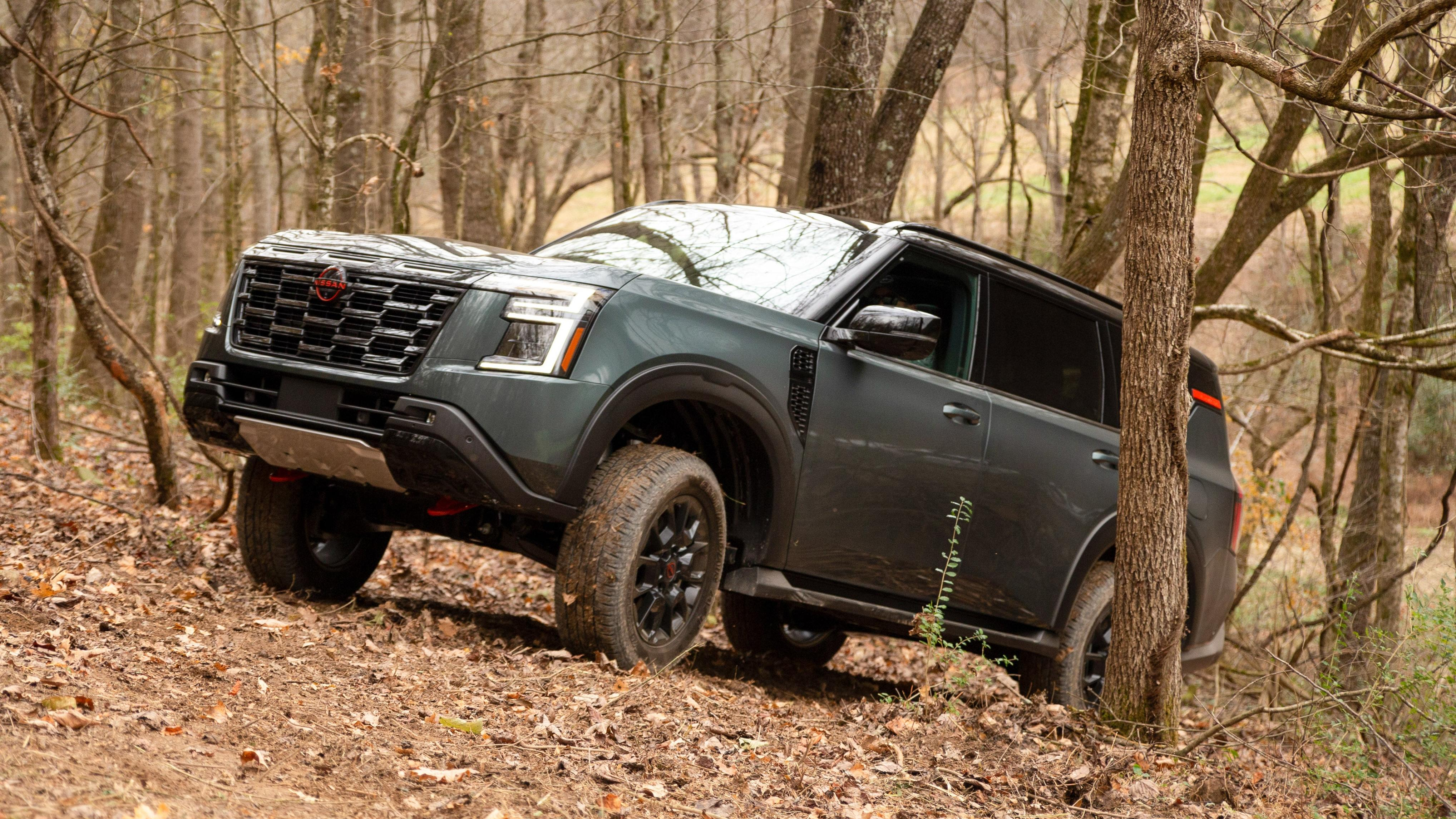
From the outside, the 2025 Nissan Armada is what I would call generically handsome. It looks good, but there also aren't a lot of design elements that really stood out to me as particularly unique or attractive. I even see a little Kia EV9 in the rear three-quarter view. It all comes together in a fairly cohesive design that, again, I do like, at least as far as three-row body-on-frame SUVs go. Besides, while exterior design is important, the cabin and how the designers used the available space is far more important.
In that regard, I'm happy to say Nissan definitely succeeded. You don't have to take my word for it, either. Just look at the pictures. To borrow a car writer cliché, that cabin just looks like a nice place to spend some time, and after spending some time behind the wheel I can confirm the Armada team didn't pull some sort of bait-and-switch on us with interior materials. It is nice in there, especially if you spring for the top trim levels. Most of the surfaces are covered in quality materials that both look and feel far more premium than you'd expect from an Expedition/Tahoe competitor. Plus, Nissan isn't lying when it talks about how comfortable its so-called Zero Gravity seats are. Those things are fantastic.
That said, the new Armada doesn't exactly make its Infiniti QX80 sibling irrelevant. Some buyers may look at a loaded Armada and decide that it's nice enough, but whether we're talking about the quilted leather seats or the materials on the doors and the dash, you can tell Nissan didn't go all-out on luxury. If that sounds like a backhanded compliment, it's not supposed to be. I would argue it was an appropriate choice not only to separate the Infiniti from the Nissan but also because the Armada is much more likely to pull family duty, and kids destroy everything they touch. While plenty nice, the leather and other materials feel like they strike a nice balance of being durable and easy to clean while also still feeling nicer than you probably need.
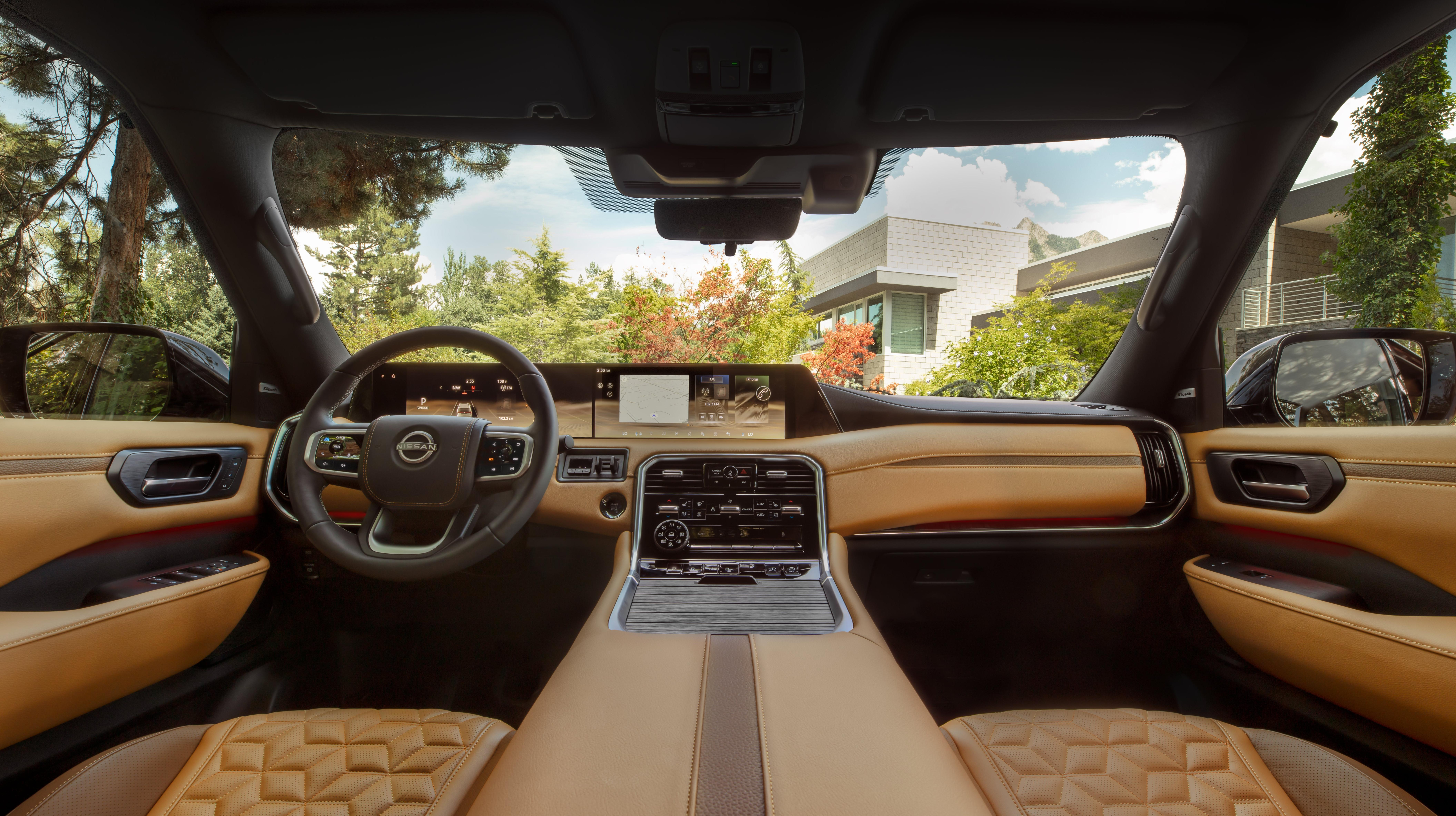
Unless you don't like piano black. There's a good bit of piano black in the center console, and when I talked to one of Nissan's employees about why that is, they told me designers love it, customers love it and since the fingerprints are relatively easy to clean off, the people who truly don't like it are a small minority. Personally, I think all piano black plastic looks cheap, but maybe that's part of why I failed at becoming a car designer, and the people who get paid to choose interior materials didn't.
Thankfully, the Armada didn't really grow much between generations. It was already a massive vehicle and didn't need to get any bigger, if only from the perspective of the pedestrians who would enjoy not getting splattered all over the front end like six-foot-tall grasshoppers. That said, there really is enough space to fit six adults, and the third row is wide enough that three adults could sit somewhat comfortably if they really needed to. When I piled into the Armada with a group of other auto journalists, we fit a 6-foot-4 journalist in the driver's seat, my 5-foot-10 self in the second row, and a 6-foot journalist in the third row without anyone's knees banging against the seat in front of them. The third-row guy's head brushed the ceiling, but it was fine. He said it was fine.
If you do decide to take five of your closest friends on a road trip in your new Armada, though, they're probably going to need to pack light. With the third row up, there's really only room for two carryon bags and a few smaller items. Then again, that's not an issue that's unique to the Armada, and I don't know if I want to drive an SUV that's big enough not only for six adults but also all of their luggage for an entire weekend. That's what cargo boxes are for.
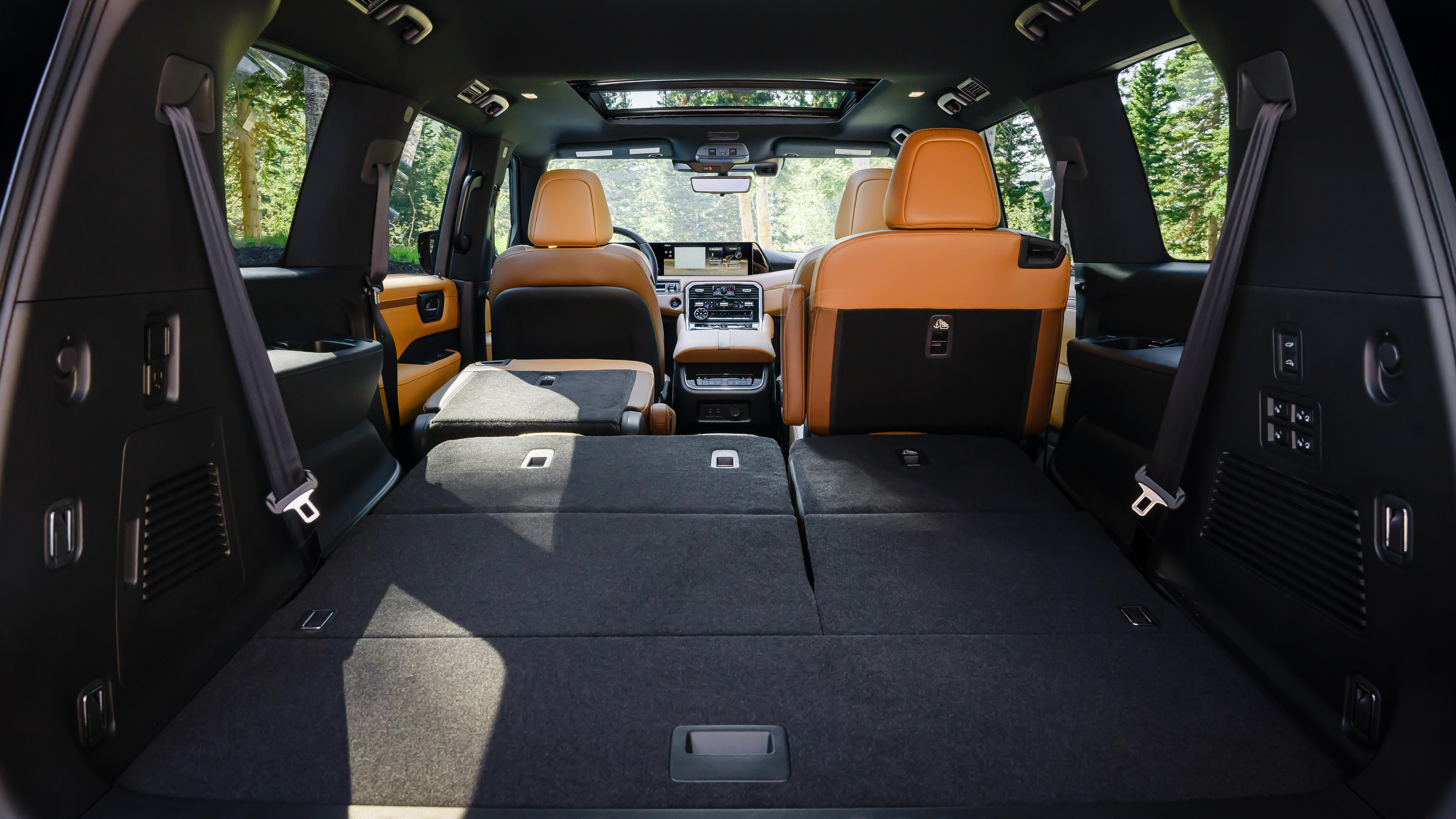
Then again, Nissan says the 20.4 cubic feet that you do get behind the third row is about 25 percent more than you got in the outgoing Armada, and with all three rows down, there's a solid 97.1 cubic feet of space for your stuff. The Tahoe and Expedition do still have the edge on total cargo volume, although it's worth pointing out that the Armada has the Expedition beat with the third row in place. You can also lower both the second and third row seats from the rear of the Armada, although only the third row is power-operated, so you'll have to manually lift the second-row seats back into place when you need them.
Under the hood you no longer get a V8, which will be disappointing for people whose entire personality is built around owning a vehicle with a V8, but it's hard to imagine many other people will care. The twin-turbo 3.5-liter V6 makes 425 horsepower and 516 pound-feet of torque, and the engine is sort of related to the V6 used in the venerable GT-R. It's been updated for truck duty, so it's not like you're getting the GT-R's exact engine in your family hauler, but if anyone gives you a hard time about driving a six-cylinder SUV, you don't have to tell them that. Just say it's the GT-R engine and force them to figure out how much of an exaggeration that is.
In both on- and off-road driving, as well as while towing, the engine and the nine-speed transmission it's paired with give you plenty of power. I wouldn't call the Armada quick, but it gets out of its own way with ease, and while it doesn't sound quite as good as it probably would with a V8, it should get better gas mileage. The outgoing Armada got 15 mpg combined, which officially Isn't Great even if you're the kind of upper-middle-class family that can afford to drop $70,000 on a family vehicle. The brakes, on the other hand, get the job done but have the long travel in the pedal that you get in a lot of trucks and SUVs, so you'll have to adjust your style if you're used to performance car brakes that grab hard as soon as you touch the brake pedal.
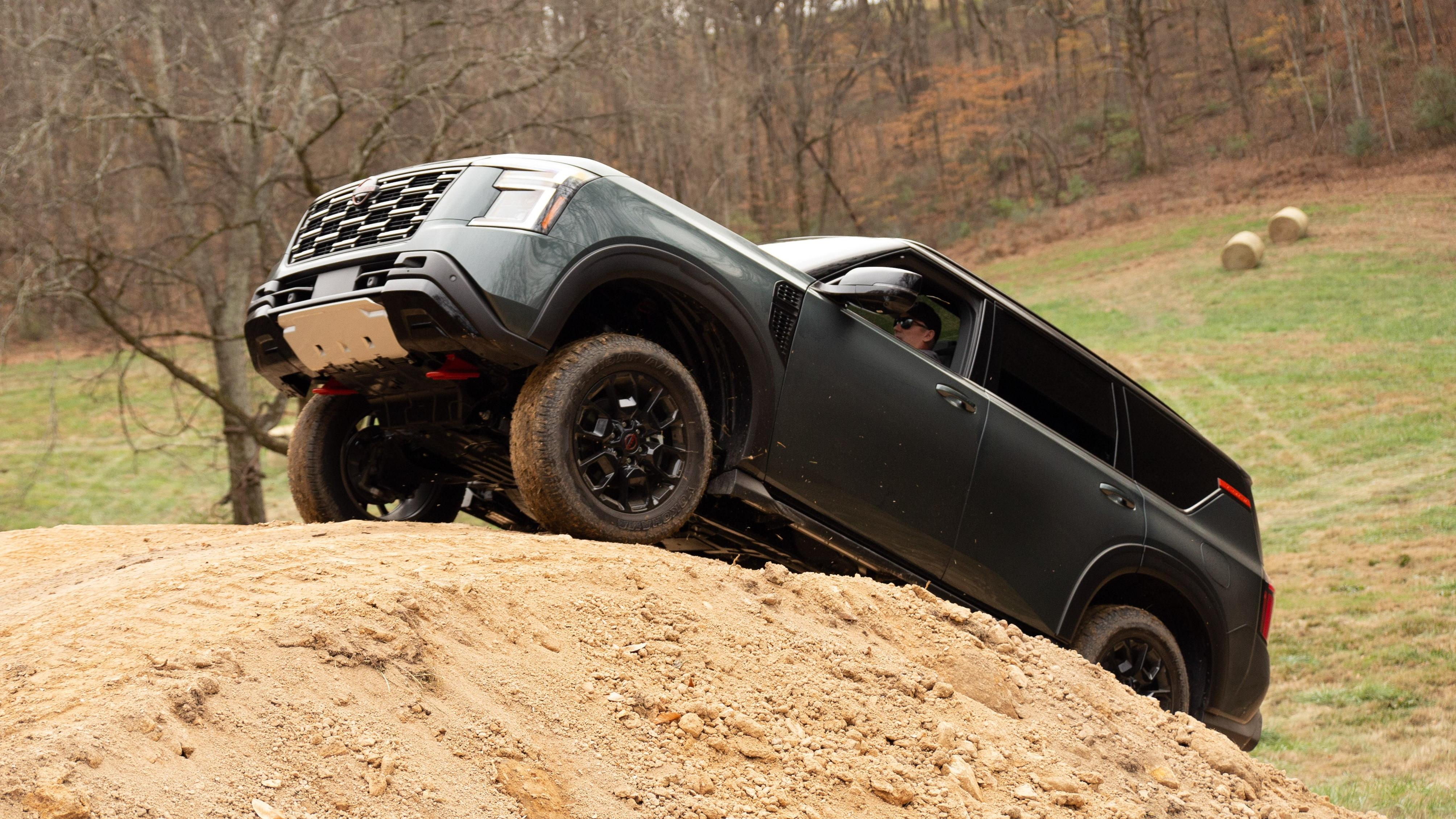
Speaking of towing, every 2025 Armada comes with a tow rating of 8,500 pounds and should be able to handle boat and travel trailer duty with ease. With a shiny and scarily pricey Airstream hooked up to the back, we weren't exactly testing the limits of what the Armada could tow, but it was still a good demonstration of how the SUV would behave while towing. I can also confirm that while no amount of technology makes it so you can't feel a trailer behind you, even dummies with limited experience should be able to tow safely. Whether that should be allowed without additional driver training is an entirely different question, but it's not like Nissan wrote the laws that allow anyone who successfully parallel parked a decade-old Toyota Corolla when they were 16 to haul a boat or a travel trailer 20 years later.
Technology is, of course, a big deal these days, and Nissan has no plans to repeat the same mistake Infiniti made when it launched the QX50 with an outdated infotainment system and no support for Apple CarPlay or Android Auto. If you want tech features, the new Armada has them in spades. For example, in addition to more standard features — like support for wireless CarPlay and Android Auto, a surround-view camera system that helps make parking easier, and heated, cooled and massaging front seats— the Armada also offers something that Nissan calls Biometric Cooling that uses infrared cameras to detect which passengers may need a little extra air conditioning when they get in. Supposedly, this will help your kids cool down when they get in after soccer practice, which is a neat idea, but I also drove the Armada by myself, so I have no idea if it works.
One notable feature that I was able to test was Nissan's latest suite of advanced driver-assistance technologies that it calls ProPilot Assist 2.1. Only offered on SL, Platinum and Platinum Reserve trims, it allows for hands-free driving on mapped highways, and while I'd want to do more extensive testing before I say too much, but it at least handled to limited highway driving well enough that I wasn't completely freaked out when I took my hands off the wheel, and I get the feeling Tesla stans will have a hard time believing that a legacy automaker is even capable of offering something like this. On Armadas without ProPilot Assist 2.1 or on roads that haven't been mapped, you still get more traditional ADAS features but have to keep your hands on the wheel while you're driving.
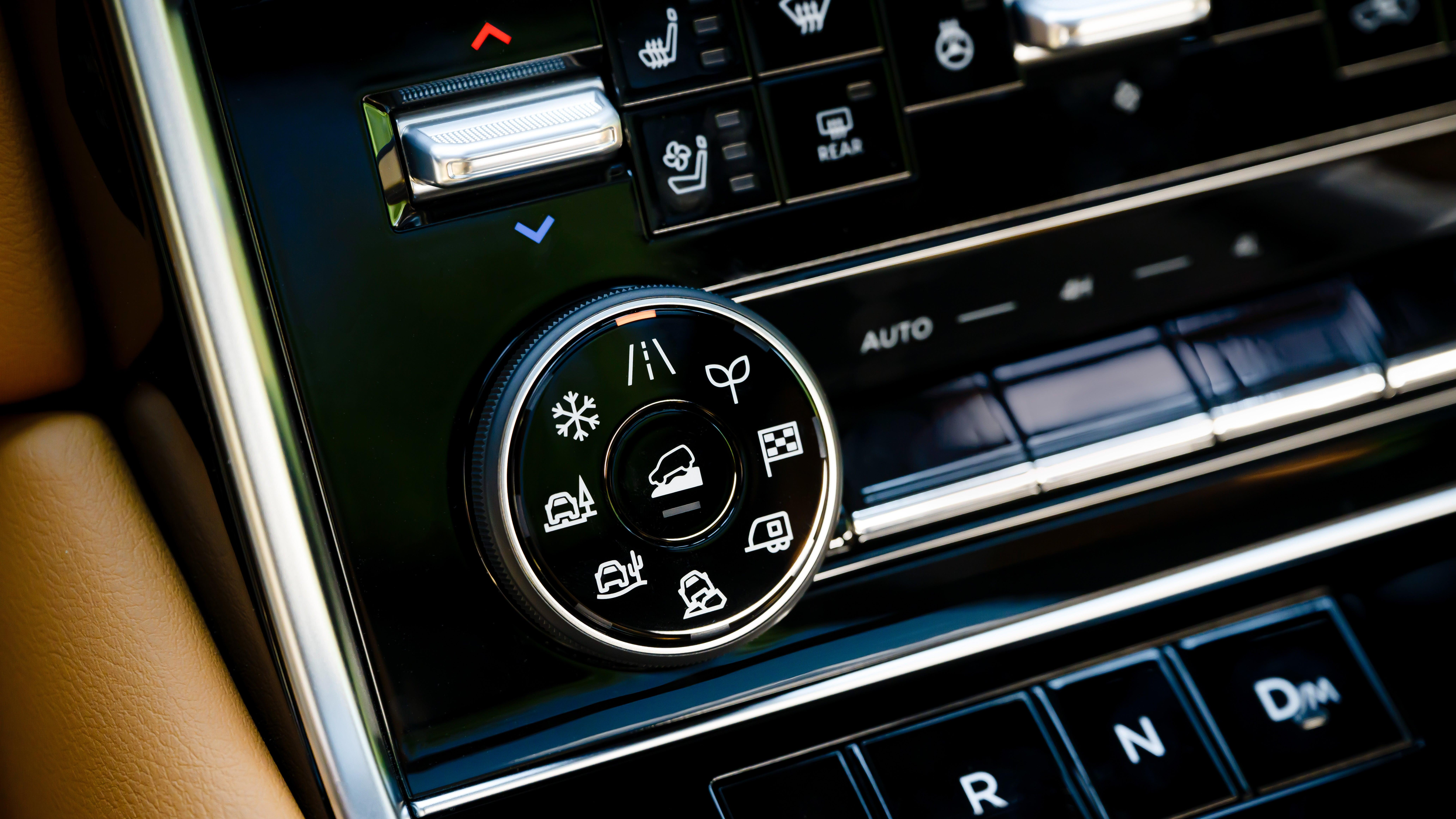
I'm also a big fan of the optional head-up display that you can get on the new Armada. It's bright, easy to read and most importantly, it displays turn-by-turn directions even if you're using Apple CarPlay or Android Auto for navigation. You can probably live without the HUD, but you're already spending a lot of money on a big SUV, so why would you? It will make your life better and also keep you a little safer.
As for the actual screens, you get a 12.3-inch driver display and a 12.3-inch infotainment screen standard, but if you upgrade to the PRO-4X, Platinum or Platinum Reserve trims, those screens both grow to 14.3 inches. Maybe that's more screen than you want in your family SUV, but Nissan skipped the trend of tossing a mega-screen into the center, and I appreciate that. As a result, you also get actual physical controls, which makes me, a devoted knob-turner, very happy. If only Nissan had also taken my love of column shifters and distaste for push-button shifters into account when deciding how you should put the transmission into gear.
Eventually, it was time for my favorite part of any press trip — the off-road course. As a car blogger, I'm automatically an out-of-touch coastal elite, but as someone who grew up in the South all I really want to do with any car I'm given is take it mudding. If only it had been warm enough for me to wear my Budweiser tank top and American flag shorts. The disappointment continued when Nissan's team told us it had rained too much to do most of the course they'd initially planned. Considering how slick the ground was in the sections we were still able to drive, they were probably right to call off the more serious stuff, but that doesn't mean I was happy about it. I guess I'll just have to plan an overlanding adventure for when an Armada Pro-4X hits the Atlanta press fleet.
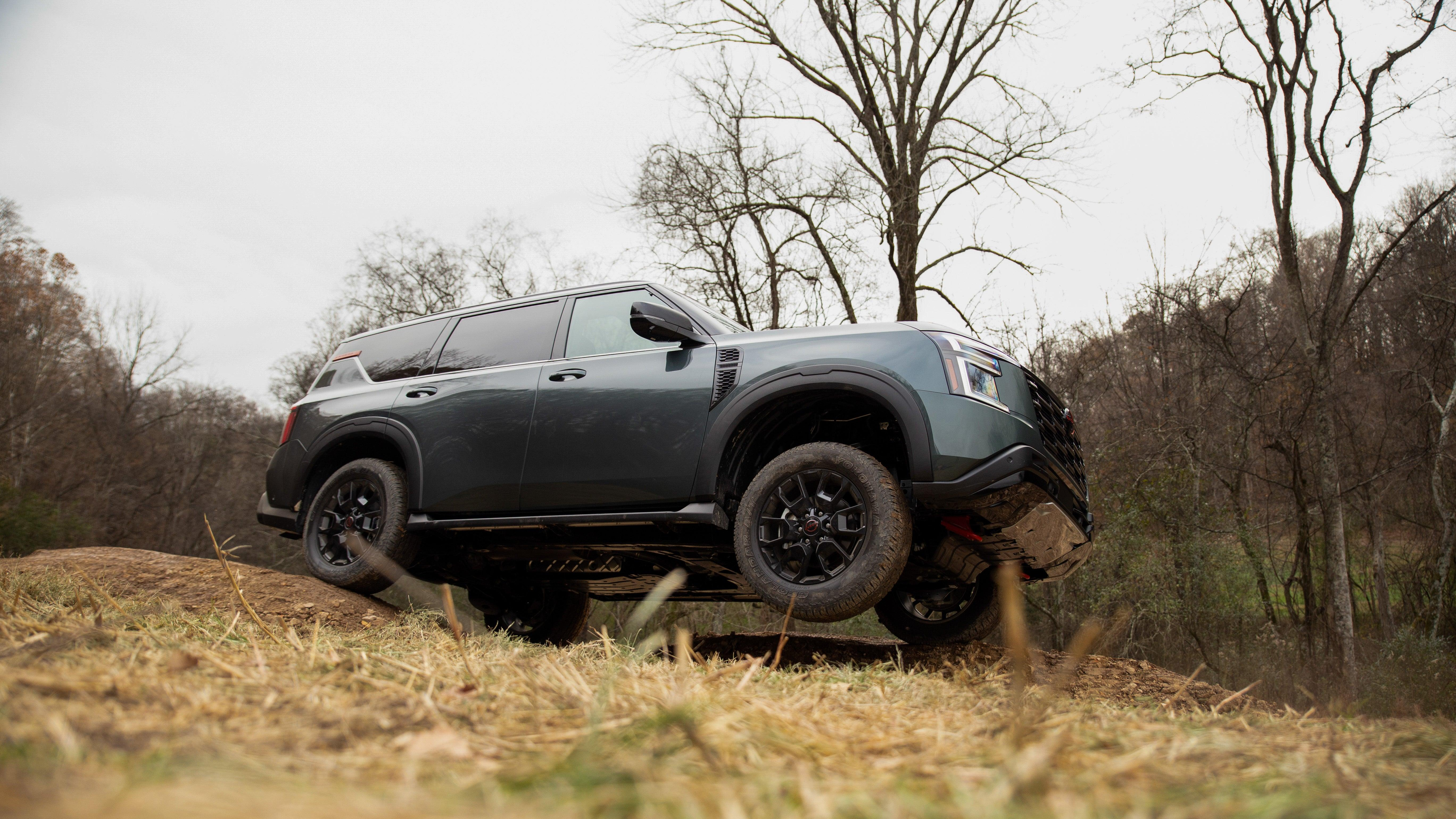
While I wasn't allowed to drive up the large hill that still looked totally climbable, we were at least able to do a few things that demonstrated just how capable the Pro-4X really is. We're talking about a 6,000-pound, three-row SUV here, so physics isn't exactly your friend, but locking the rear diff made easy work of what appeared to be about a 45-degree incline, and the front-facing camera made it easy to place the wheels even when I couldn't see over the hood. In fact, you can even activate an invisible hood mode that shows the ground under your car overlayed on a display that's also sharp enough to really see where you're going and what obstacles to avoid.
Another section of the course involved getting two wheels off the ground, and even with all the mud, the Armada barely even blinked. The air suspension also did an impressive job of smoothing out impacts and helping the Armada feel under control. I'm well aware we were in a pretty controlled environment driving over man-made obstacles that were specifically designed with the Armada's capabilities in mind, so it's not like we were pushing the limits of what it could do at any point, but I'm at least comfortable saying the Armada will go far further off-road than the overwhelming majority of Pro-4X buyers will ever need it to. Will it be able to tackle Hell's Revenge with the same sense of ease? I don't know, but maybe Nissan should assist me in finding out.
If I had to guess, though, the biggest issue with off-roading the new Armada — aside from most owners not wanting to add desert pinstripes to their paint — is simply going to be its size. This thing is big, and while I didn't hit anything, part of the trail included a tree that I came uncomfortably close to scraping. Other drivers also came within a few inches of that tree, too, so it wasn't just me. This is a long, wide SUV, and while that may not be a problem in the desert, other trails are going to be an issue.
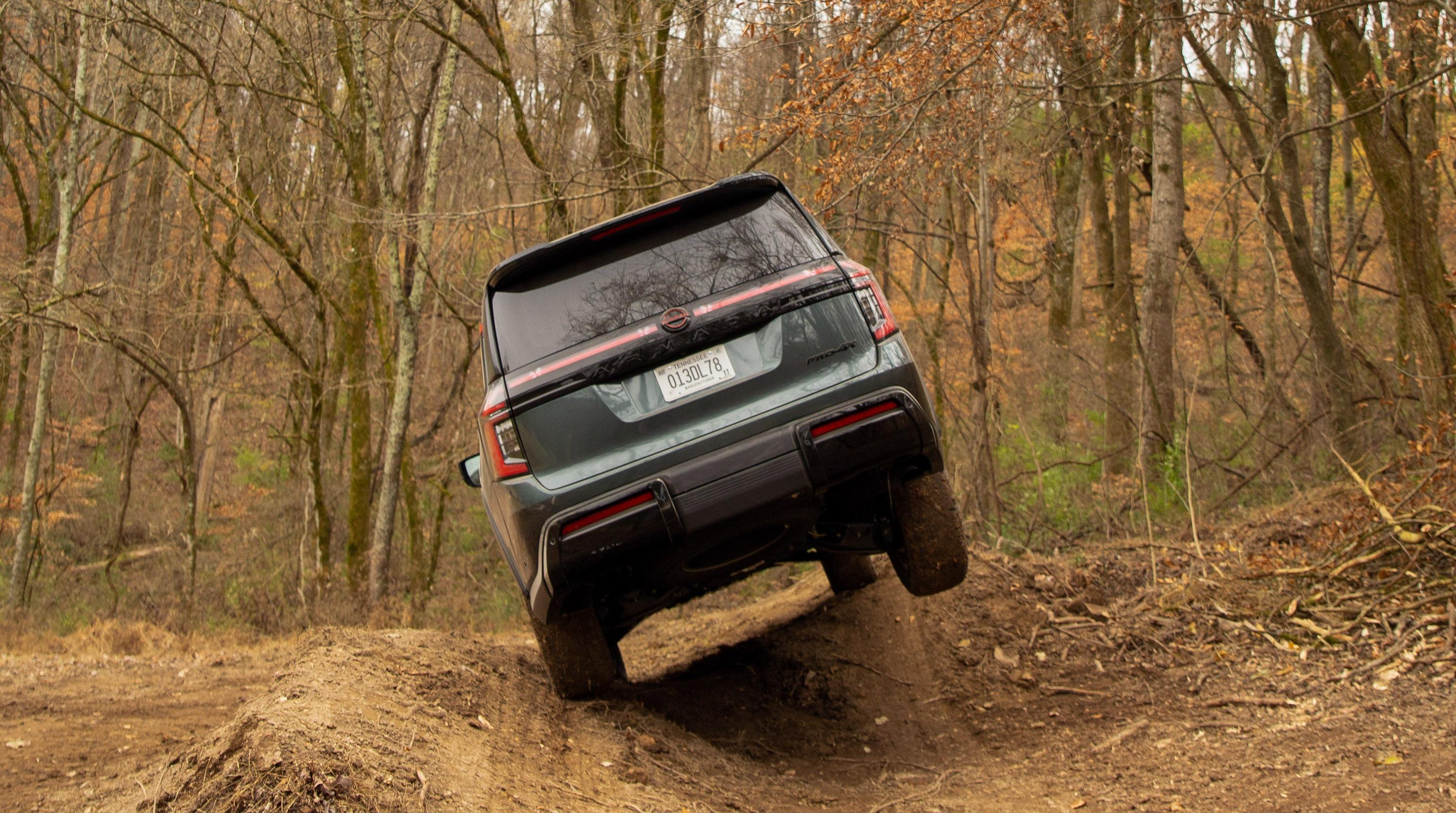
If only Nissan had a smaller, narrower body-on-frame SUV in its lineup, perhaps based on the Frontier. You know, like a new Xterra. Since I couldn't really get a straight answer to why there's no new Xterra, it probably has to do with money and internal politics, but come on, Nissan. A new Xterra would print money, and I mean that seriously, not tongue-in-cheek like my previous plans for a Miata But Bigger and the truck-like Challenger Rampage. Maybe if enough people buy Armadas, Nissan will finally have enough money to give us the Xterra we've been clamoring for. Either that, or it's coming out soon, and everyone who told me they wished that was in the cards is just a damn good liar has one heck of a poker face.
Considering how much nicer the new Armada is, you'd probably expect it to be a good bit more expensive than the outgoing model, but the base SV model actually has the same starting price regardless of whether you get rear ($56,520) or four-wheel drive ($59,520). However, Nissan says it expects the SL version to be the volume seller, and that one starts at $62,970 plus an extra $3,000 if you want 4WD. The Pro-4X, on the other hand, starts at $73,740, while a 4WD Platinum Reserve will set you back $79,900.
Those prices certainly aren't exactly low, but they're also in line with what you'd expect in this segment. A base Tahoe is a few thousand dollars more, while the Expedition starts about $1,000 below the Armada. And ultimately, I get the feeling Nissan is going to have a harder time getting people to test drive the new Armada than it will convincing those who do to pull the trigger. The marketing line about it being a more affordable Infiniti QX80 may have come directly from Nissan, but I buy it. The 2025 Nissan Armada just feels nicer than its competitors, and that will probably sell more of them than the locking rear differential, underbody protection or the fact that it's now just a Patrol with a different name.
